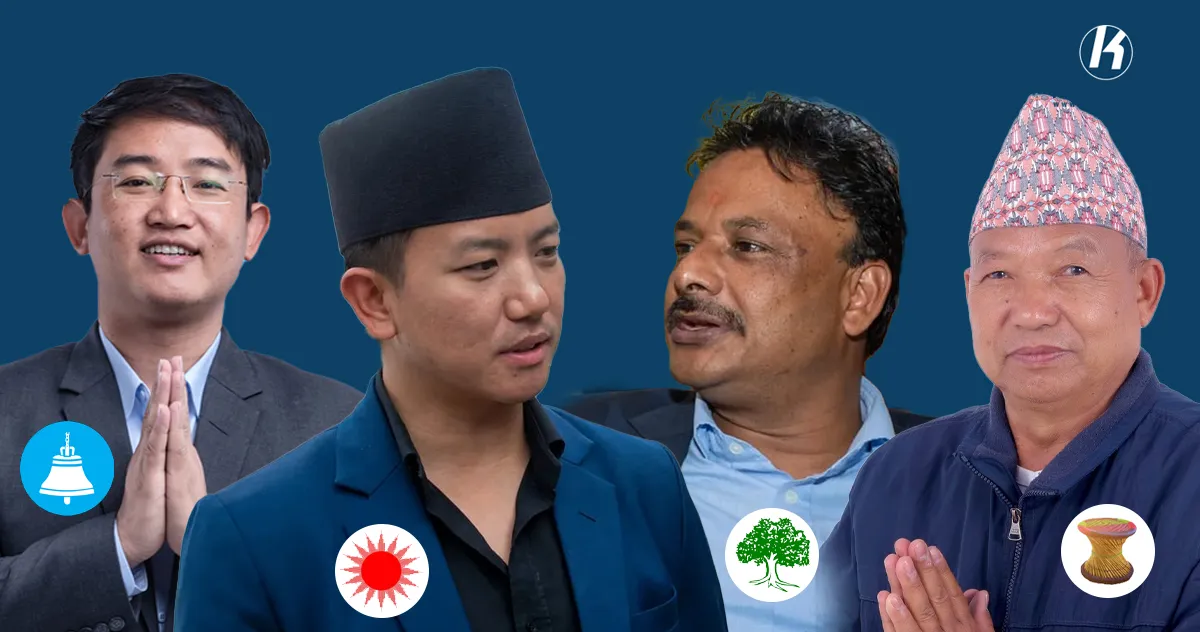KATHMANDU: Suhang Nembang of CPN-UML emerged victorious in the Ilam-2 by-election, continuing the political legacy of the Nemwang family.
Suhang’s father, Subash Nembang, previously represented Ilam 2 in the House of Representatives.
The UML is celebrating this victory today in Ilam, with Chairman KP Sharma Oli and other prominent party leaders in attendance.
While the UML celebrates its victory, the Nepali Congress, Rastriya Swatantra Party (RSP), and a candidate of identity politics have faced defeat and criticism.
Although UML won the by-election in Ilam, the party’s hold has weakened, evidenced by a decrease in votes compared to previous elections.
Notably, the Nepali Congress lost more votes than UML, and CPN (Maoist Center) lost more votes than the Nepali Congress.
Considering the balance of power, both UML and Nepali Congress have reasons for concern, with the RSP appearing relatively stable.
Despite failing to secure 10 percent of the total votes cast, the RSP has maintained its political standing and voter base.
Dakendra Thegim, a candidate of identity politics, also faced defeat but garnered a significant 11,000 votes, securing third position.
Why did UML’s vote decrease?
The decline in UML’s vote share prompts a critical examination of the factors contributing to this decrease.
In the previous election, Subhash Nembang of UML secured victory in the same constituency with 30,020 votes.
However, his son, Suhang, garnered 27,772 votes in the recent by-election, nearly 3,000 votes less than his father.
In the previous election, Subhash Nembang faced competition solely from the NC, CPN (Maoist Center), and CPN (Unified Socialist) parties, yet still managed to secure over 30,000 votes. However, despite the support of CPN (Maoist Center), Pariwar Dal, and the Biplab group, Suhang fell short by around 3,000 votes.
CPN (Maoist Center) claimed to wield approximately 5,000 proportional votes in the constituency, raising questions about why UML’s vote count decreased despite their support.
Did Maoist Center cadres fail to vote for Suhang, or is UML’s grip on Ilam-2 weakening? These are crucial considerations for the UML.
In the previous election, the total voter turnout was 66,185, whereas this time, the total valid votes stood at 68,472. Despite the increased turnout, Suhang’s failure to surpass his father’s vote count suggests a different narrative.
Subhash Nembang secured 45.36% of the votes in the previous election, which has now decreased to 40.56%. UML has experienced a notable decline of almost five percent in its vote share.
While Suhang seemingly defeated the NC candidate by a larger margin than his father, it’s essential to note that NC itself received fewer votes in this election compared to the previous one.
Dambar Khadka of NC secured 29,906 votes previously but only garnered 21,942 votes in the recent by-election, resulting in a widened vote margin with UML.
On a positive note, UML managed to secure its proportional votes.
In the 2079 election, UML received 26,562 votes in the proportional system.
Suhang added 1,210 votes to that, totaling 27,772 votes.
However, considering the support of Maoist Center, which received 5,153 votes in the previous election, UML’s proportional votes should have increased significantly more than 1,200.
The apparent discrepancy raises questions about UML’s popularity or whether the Maoist Center’s support translated into votes for Suhang.
What about Nepali Congress?
The future of the Nepali Congress appears uncertain, as evidenced by the loss of 7,964 votes in comparison to the previous election.
While it may be tempting to attribute this decline to the party’s support by the Maoist Center in the previous election, there is another aspect of the story to consider.
In the previous election, the Nepali Congress garnered 22,333 votes in the proportional system, constituting its sole source of votes.
However, in the recent by-election, the party failed to secure even these votes.
In simple terms, Dambar Khadka received fewer votes, tallying at 21,942, than the proportional vote that the Nepali Congress obtained in the previous election.
This indicates that the Nepali Congress did not retain its own votes this time around.
Advantage for RSP
The Rastriya Swatantra Party (RSP) may have faced disappointment with its fourth-place finish in Ilam-2, despite Swarnim Wagle’s optimistic predictions prior to the election.
However, there are notable advantages for the party to consider.
In the previous election, RSP held the third position with 1,380 votes.
This time, the party significantly increased its vote count to 5,020 votes, marking a considerable gain.
While the Nepali Congress and UML suffered losses, RSP saw growth in its support base.
Moreover, under the proportional system, RSP secured 4,686 votes in the previous election.
This time, Milan Limbu added to this count, indicating that the party successfully retained its proportional votes.
Overall, despite not achieving the desired outcome in terms of ranking, RSP’s substantial increase in votes suggests a growing support base and potential for future electoral success.
Rise of Identity Politics
The rise of identity politics emerges as a significant development in the Ilam-2 by-election, warranting close observation.
Dakendra Thegim’s securing of the third position with 11,000 votes poses a formidable challenge to established parties like UML, Nepali Congress, and RSP.
These identity-based political groups are poised to play a pivotal role in upcoming elections, potentially impeding the advancement of RSP and restraining the influence of the NC and UML.
However, the lack of a dedicated political party structure poses a challenge for these identity-based groups to solidify and institutionalize their voter base.
In conclusion, while UML has secured a seat in the House of Representatives, its weakening hold suggests a shifting political landscape in Ilam-2, with the rise of identity politics reshaping traditional power dynamics.









Comment